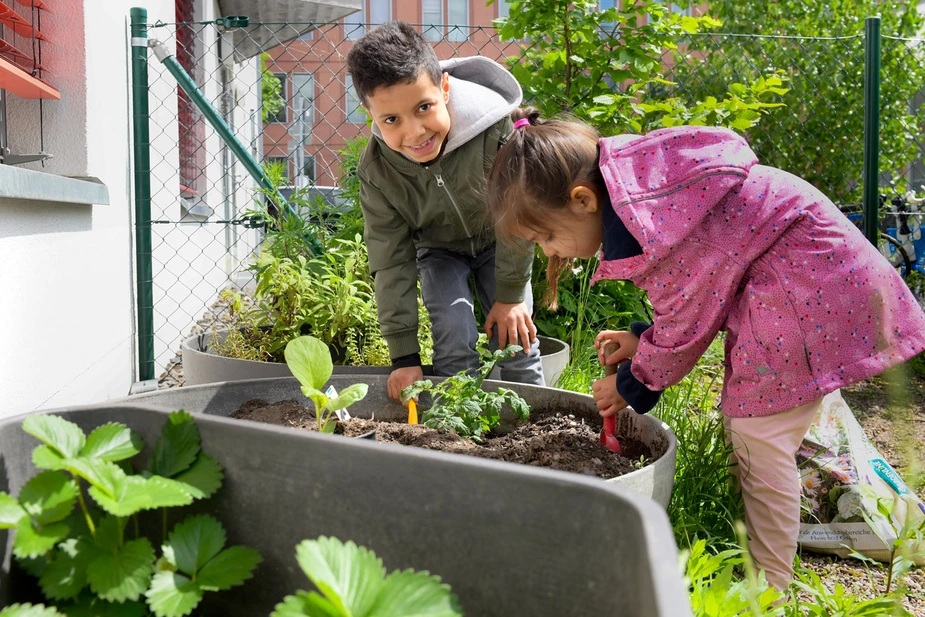Gardeners in the beehive
A glimpse into everyday life of a sustainable daycare centre
Protecting plants and animals, being mindful of fellow human beings, treating each other peacefully, not wasting food, and recycling—we look inside a daycare centre to see how Adlershof’s youngest are learning about sustainability early on.
Leyla is eying Khalil sceptically. The six-year-old is right in the middle of digging a hole with considerable enthusiasm, while the four-year-old is holding on to her shovel, unsure whether it’s okay to get her hands dirty or not. They are two of a handful of kids that are in the garden of “Kinderhaus Bienennest”, a Montessori daycare centre. The nursery is located on the ground floor of one of the ten Passivhaus buildings in Adlershof’s so-called Student Village, a dormitory complex.
On that afternoon at the nursery, it’s all about plants. A large round container serves as a flower bed. The little gardeners will be taking turns planting vegetables. Another pot has strawberries. You can already see a small red berry peaking through the green, ready to be picked. Different herbs are burgeoning out of one of the nursery garden’s other tubs. The children are also tending to another patch in the adjacent uni garden that belongs to the students of Humboldt University.
Khahil has gone for a tomato seedling, Leyla has chosen aubergine. Teacher Özgür stands back, leaving the little nippers to do most things by themselves. He asks them if the hole is big enough to fit the plant, holds open the bag of soil, and helps them to press the saplings into the soil. Özgür and the children sometimes speak English, sometimes German. The centre is bilingual and home to a total of 30 kids between one and six from 15 different countries. Özgür, who came to Berlin from Istanbul three years ago, is a good match. He studied molecular biology and genetic engineering in Turkey but, after he got his BA, decided he didn’t want to stand in a lab all day but rather work in the social sector. He worked at the daycare centre in Adlershof for two years through a programme of EVS (European Voluntary Service) and the Federal Volunteers Service and started an apprenticeship as a daycare teacher last summer.
Özgür is very patient and makes sure no child comes up short. When Khalil runs off to fetch water with his mini watering can, he encourages Leyla, still waiting hesitantly at the side of the patch, to put in her aubergine plant. Özgür helps her take the tender plant out of the pot and asks her what should happen with the plastic casing. “It goes in the plastic bin,” Leyla says promptly. The four-year-old is a bit unsure when he asks whether that’s the blue or the yellow bin. Stickers on the daycare’s colourful rubbish bins show the kids what goes where.
Planting, caring, harvesting—and, of course, tasting—and recycling—these young kids learn, almost in passing, what it means to behave environmentally friendly and to eat healthily. “Two years ago we grew a water melon and made melon juice with mint,” says Özgür, still getting excited about it. Issues of sustainable living play role in all aspects of the everyday life at the nursery. Pictures on the dining room walls show the types of foods that make up a healthy breakfast. The children learn that neither chocolate nor cake belong in their breakfast box. Their toys are made of wood and other natural materials. Regular excursions to the landscaped park Johannisthal/Adlershof or to the Planets playground teach an understanding of nature.
Of course, the fact that the centre is called “Bee’s Nest” also comes with certain obligations. Protecting bees is a long-standing project at the Kinderhaus. There are cuddly bees in all shapes and sizes all across the house, children’s drawings of the useful black-and-yellow creatures adorn the walls, and kids like Khalil and Leyla learn a lot about the way of life of the precious suppliers of honey.
By Sylvia Nitschke for Adlershof Journal
